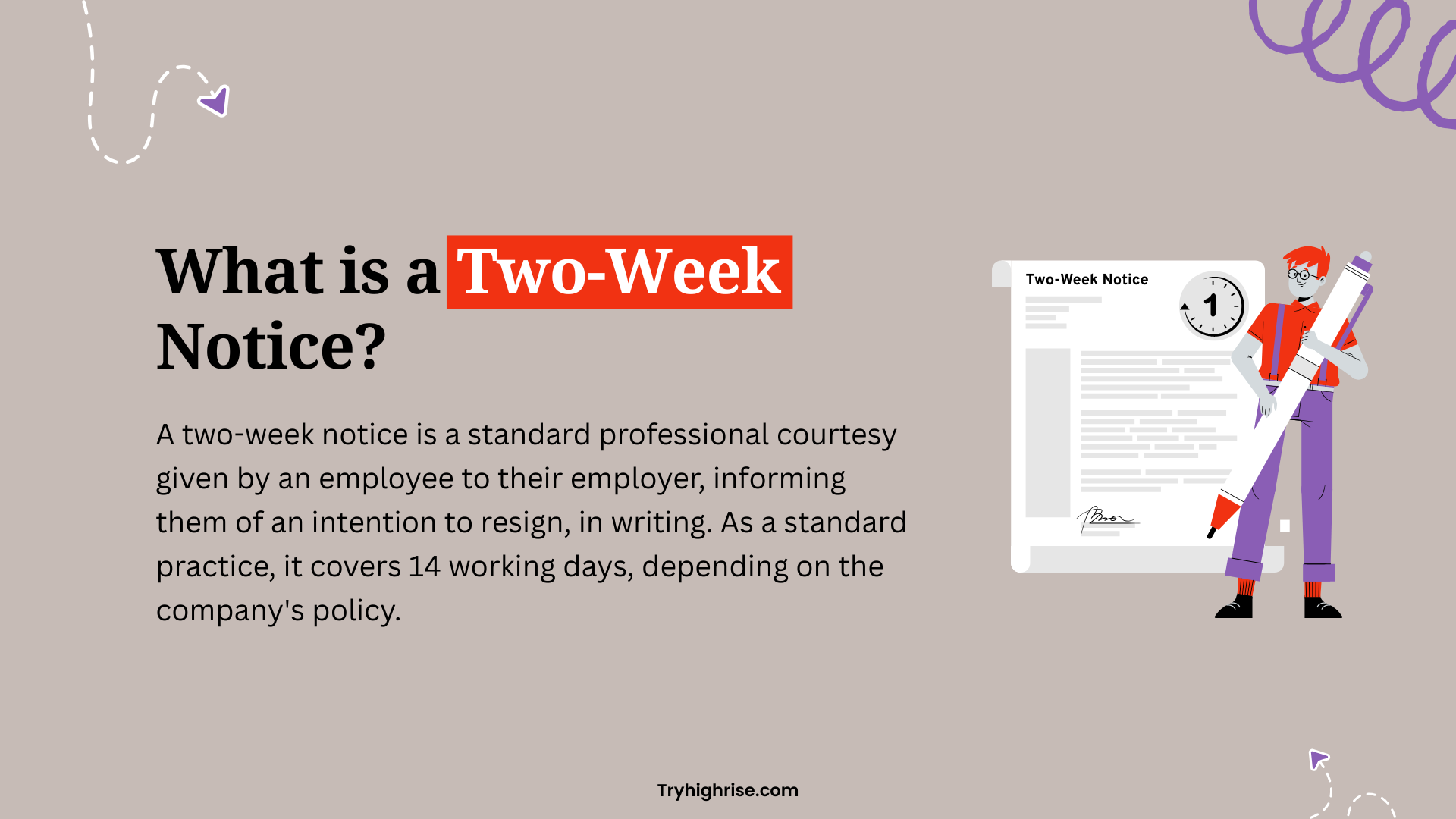<div id ="six">
Two Weeks Notice: Do's and Don'ts
Here are some do's and don'ts to keep in mind when serving your notice:
Do's
Keep Up Your Productivity
Once you give in your resignation email, you might be tempted to slack off and run out the clock, harming your reputation.
Slowing down your productivity might lead to heaps of work for the remaining coworkers, and your projects might not get completed in time.
While this might not harm you directly, it will negatively impact your professional legacy at the organization. If you want to maintain relationships, keep showing up through the end date of your notice.
Tie Up Loose Ends
Once you resign, try your best to complete any pending projects, hand in any company property, and hand over any duties that require attention.
Ensuring that your desk is clean when you leave for your new employer is a professional way to handle things, even if it's not a legal requirement.
Keep Your Team In the Loop
Once you decide to leave, inform your team immediately. This is critical to ensuring that work continues and helps others contribute to a transition plan as needed..
Additionally, inform your clients and associates of your decision. You'll want to make sure every person impacted by your leaving knows about your plan.
Be Courteous
Be positive and diplomatic as you make your next move. Show gratitude to your colleagues and thank them for the opportunity to work with them.
This also increases the chances of keeping your manager or colleagues in your professional network.
Document Your Experience
As you serve your last two weeks in a role, it is important to document your experience. Write letters, memos, and emails to members of your team.
This leaves a trail of documentation that will help boost technical expertise and leadership experience within the organization, as well as help you maintain those relationships.
Ask For Recommendation Letters and References
Recommendation letters and references play a big role in any professional organization. They will greatly impact how you are perceived in future roles.
Knowing this, you should use this time to say your goodbyes and ask colleagues for positive but truthful accounts of working with you. This will go a long way in creating a robust professional network that will help you navigate your next steps.
Transfer Your Knowledge
Considering the short duration of most notice periods, completing all projects assigned to you might not be feasible.
In most cases, it is more appropriate to transfer your knowledge to others and hope they carry on your work.
This will lessen the impact of your departure and serve as a sign of respect for them. Offer assistance anywhere possible and keep advising until your last day at the organization.
Don'ts
Settle Scores
While it might be tempting, do not use this time to settle scores with colleagues you do not like.
Settling scores may involve writing poor appraisals, spreading malicious rumors, sabotaging work, or misdirecting colleagues with false information.
It is only natural to harbor negative feelings about some aspects of professional life. Still, these activities will harm your reputation in the long term – and they might even result in legal repercussions.
Don't Make a Big Deal Out Of Your New Job
Understandably, you might be excited and make a big deal out of a new job once you've decided to leave. However, this might hurt the work environment you are leaving, making it difficult for them to maintain standards or workflow.
If you are comfortable sharing, keep it respectful. Do not brag about salary, cool equipment, or entertainment options.
Making a big deal of your new job can disrupt the work environment, or you might inadvertently belittle your organization and colleagues.
Make Commitments You Cannot Fulfill
Once you know that you will be leaving, consider the responsibilities and boundaries of your job.
If you cannot deliver final projects before your last day, politely inform your team and only take on what you can manage. You can offer assistance where needed, but do not commit if you cannot deliver.
This might seem selfish, but it helps the team remain functional once you leave.
Treat the Notice Period As a Vacation
This is unprofessional and a sign of poor work ethic.
Instead, think of this as a chance to showcase your professionalism. Go above and beyond to ensure that you leave on a high note.
Fulfilling the terms of your contract and leaving with the respect of your manager and colleagues is more beneficial in the long term.











-min.jpg)
-min.jpg)






